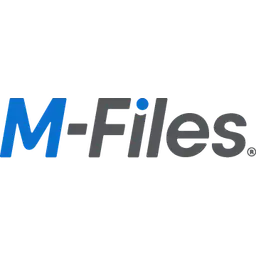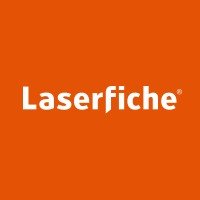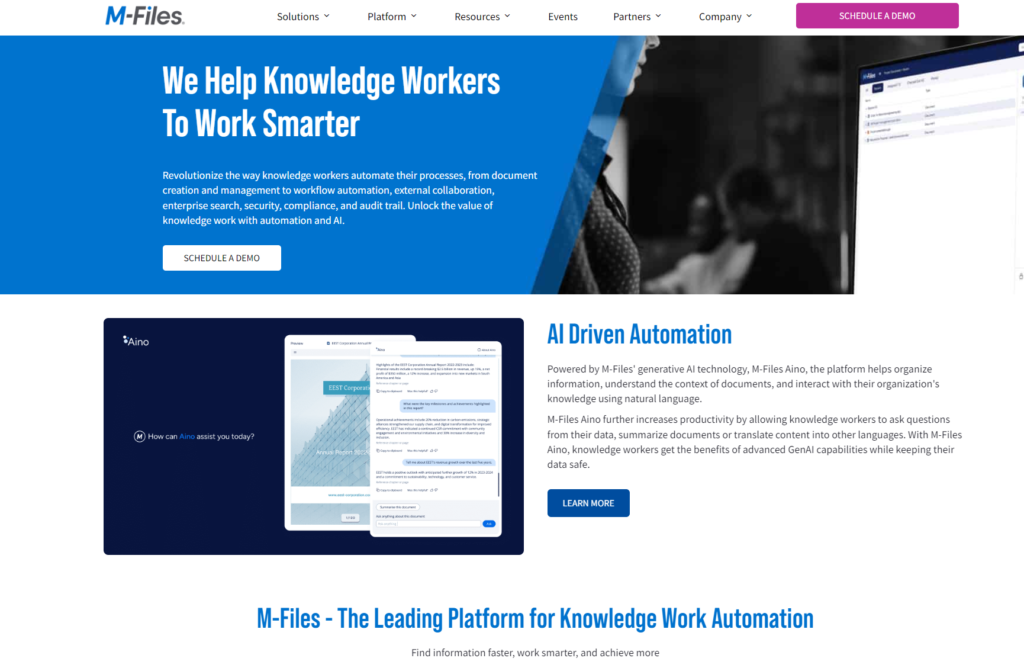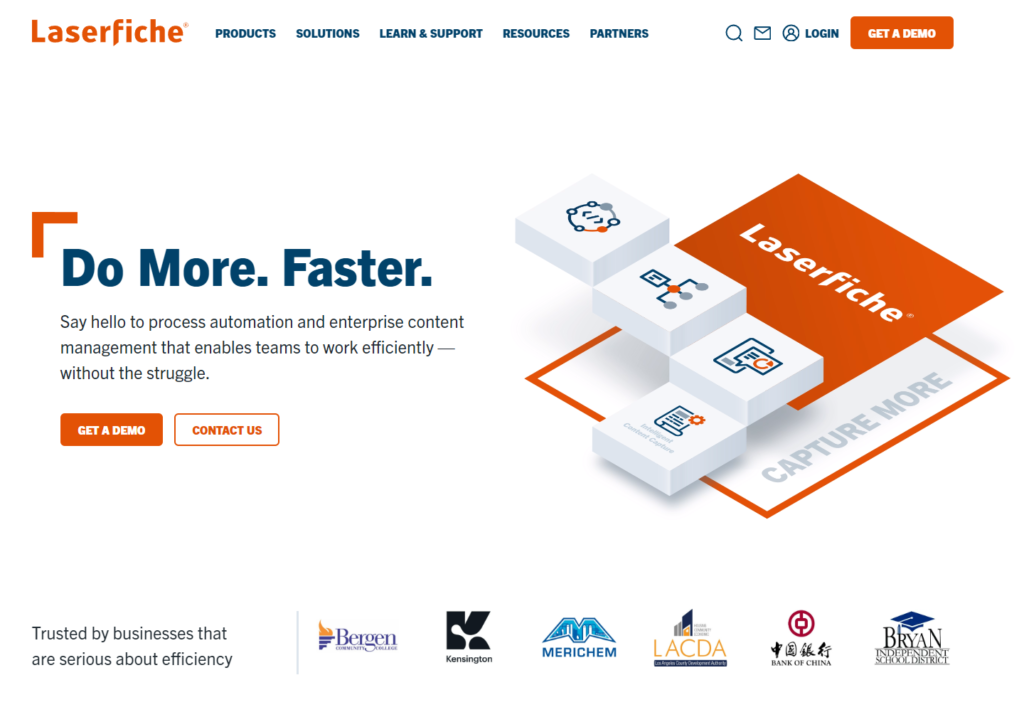In today’s digital-first world, the quest for the perfect document management system (DMS) is akin to searching for a needle in a haystack—a needle that can significantly streamline your workflows, enhance productivity, and safeguard your digital assets. Amidst a sea of options, M-Files and Laserfiche emerge as two leading contenders, each boasting unique strengths and philosophies towards document management. But when the rubber meets the road, which system holds the key to unlocking maximum efficiency and organizational synergy for your team? Let’s dive into this head-to-head showdown, starting with a crucial battleground: Integration Capabilities.
M-Files | Laserfiche |
|---|---|
| G2 Score – 4.3 out of 5 stars | G2 Score – 4.7 out of 5 stars |
| TrustRadius Score – 9.2/10 | TrustRadius Score – 8.7/10 |
Integration Capabilities: The Linchpin of Workflow Efficiency
In the modern workplace, a DMS doesn’t operate in isolation—it needs to seamlessly mesh with the array of tools and systems your organization already uses. The ease with which a DMS integrates into your existing software ecosystem can make or break its effectiveness.
M-Files: The Agile Integrator
M-Files prides itself on its agility and adaptability, boasting robust integration capabilities that allow it to fit snugly into nearly any technological environment. Thanks to its API-first approach, M-Files can connect with a myriad of business applications—from CRM systems like Salesforce to ERP systems such as SAP—creating a unified and streamlined workflow. Its metadata-driven structure further enhances this capability, allowing for dynamic document management that evolves with your business needs.
While M-Files offers extensive integration possibilities, fully leveraging its capabilities may require a steep learning curve or assistance from IT specialists. The initial setup and customization process, crucial for achieving seamless integration, can be time-intensive, potentially delaying the immediate benefits of implementation.
Laserfiche: The Structured Systematizer
Laserfiche comes equipped with a suite of tools designed to promote ease of integration within established IT infrastructures. It offers pre-built connectors and a robust API that facilitate its integration with major business applications, ensuring that documents flow seamlessly across systems. Laserfiche’s focus on automation and electronic forms (e-forms) also streamlines processes across different platforms, enhancing organizational efficiency.
Although Laserfiche provides powerful integration tools, maximizing these features often requires a deep dive into its specific programming language and workflow design. This can necessitate dedicated resources or specialized training, potentially making it a less agile option for organizations with limited IT bandwidth.
Security and Compliance: The Bedrock of Trust and Integrity
With the increasing prevalence of cyber threats and the ever-evolving landscape of regulatory requirements, the ability of a document management system to safeguard sensitive information and facilitate adherence to legal standards is paramount. The robustness of a document management system’s security framework, along with its capacity to support compliance with regulatory standards, is foundational for protecting an organization’s data and maintaining its reputation.
M-Files: Security with a Metadata Edge
M-Files leverages its metadata-driven architecture to offer advanced security features that ensure sensitive information is accessible only to authorized users. Encryption of data both in transit and at rest, coupled with granular access controls and automatic permissions based on metadata, provides a high level of data protection. M-Files’ approach not only secures documents but also dynamically adjusts access based on the document’s context and user’s role, enhancing security without sacrificing flexibility.
M-Files excels in facilitating compliance with a wide array of regulatory frameworks, from GDPR to HIPAA, through its intuitive management of document lifecycles, audit trails, and retention policies. The platform automates many aspects of compliance, significantly reducing the risk of human error and making it easier for organizations to prove adherence to legal requirements through comprehensive reporting and documentation.
Laserfiche: Structured Security and Regulatory Adherence
Laserfiche offers a robust security model that includes document encryption, detailed access controls, and activity monitoring to protect against unauthorized access and data breaches. Its security measures are designed to ensure that only authorized personnel can access sensitive information, with the ability to set specific permissions at the document, folder, and system levels.
With built-in support for records management and retention policies, Laserfiche simplifies the process of meeting regulatory compliance requirements. The platform provides tools for automating document retention schedules, managing records according to legal guidelines, and generating audit trails that document every action taken on a file, making it easier for organizations to maintain compliance with regulations such as GDPR, HIPAA, and others.

Related: Check out our free SEO suite

Scalability and Customization: Adapting to Growth and Changing Needs
The ability for a document management system to grow with your organization and adapt to unique business processes is essential for long-term success and operational efficiency. A document management system must not only fit your current needs but also have the capacity to expand and evolve alongside your organization.
M-Files: Agile Scalability Meets Deep Customization
M-Files is designed with scalability in mind, capable of accommodating businesses as they grow from small teams to large enterprises. Its flexible architecture ensures that increasing the volume of documents or expanding the user base does not compromise performance. M-Files supports cloud, on-premises, and hybrid deployments, offering organizations the flexibility to choose the model that best fits their scaling strategy.
The strength of M-Files lies in its metadata-driven approach, which allows for extensive customization of document management processes. Organizations can tailor M-Files to their specific workflows, document types, and security requirements. The platform supports the creation of custom metadata fields, document templates, and automated workflows, enabling a highly personalized document management environment that can adapt to any business need.
Laserfiche: Robust Scalability with Structured Customization
Laserfiche is known for its robust scalability, effectively serving a wide range of organizations, from small businesses to large governmental agencies. Its performance remains strong as document volumes and user numbers increase, making it a reliable choice for organizations planning for significant growth. Laserfiche also offers various deployment options, including cloud and on-premises solutions, to accommodate different scalability requirements.
Laserfiche provides powerful customization capabilities, allowing organizations to configure the system to match their unique operational processes. Through the use of templates, electronic forms, and automated workflows, businesses can streamline document handling and approvals. While Laserfiche’s customization is potent, achieving the desired setup can sometimes require specialized knowledge or assistance from Laserfiche consultants.
Search Functionality and Document Retrieval: The Pulse of Productivity
In an era where time is of the essence, the efficiency with which users can locate and access documents in a DMS becomes critical.
M-Files: Precision Meets Intelligence
M-Files stands out with its sophisticated search functionality, grounded in its unique metadata-driven approach. Users can perform searches based on document content, metadata, or context, allowing for highly precise and relevant results. M-Files also offers “intelligent” search features that can suggest documents relevant to the user’s current task or project, significantly streamlining the retrieval process.
The strength of M-Files in document retrieval is its dynamic organization system that eschews traditional folder structures in favor of metadata-based categorization. This allows documents to be associated with multiple contexts or projects without duplication, simplifying the retrieval process and minimizing the time users spend searching for information.
Laserfiche: Efficiency Through Structure
Laserfiche provides efficient search functionality that enables users to find documents quickly through a combination of keyword searches, tagging, and indexing. Its system supports full-text search, allowing users to locate documents based on their content, as well as metadata searches for more refined results. Laserfiche’s search capabilities are designed to be robust yet user-friendly, catering to the needs of a wide range of users.
Laserfiche excels in document retrieval by offering a well-organized, folder-based system complemented by tagging and metadata classification. This structured approach, while perhaps more traditional than M-Files’, ensures that users can easily navigate the system and retrieve documents efficiently. Laserfiche’s version control and audit trail features further enhance the retrieval process, providing users with access to document histories and modifications.
Mobile Accessibility and Remote Work Support: Empowering a Distributed Workforce
The extent to which a DMS can provide a seamless, efficient experience across devices, enabling employees to access, manage, and collaborate on documents from anywhere, significantly influences organizational agility and productivity.
Anywhere Access with Intuitive Mobile Experience
M-Files offers a robust mobile application designed to extend the full capabilities of its DMS to smartphones and tablets. The app provides users with secure access to documents, enabling searching, viewing, editing, and sharing functionalities directly from their mobile devices. M-Files’ mobile app emphasizes a seamless user experience, ensuring that employees can remain productive and connected, regardless of their location.
M-Files excels in supporting remote work through its flexible, metadata-driven architecture. It allows remote teams to access the most current documents and information relevant to their tasks or projects seamlessly. The platform’s strong version control and workflow automation capabilities further facilitate collaboration among distributed teams, streamlining document-centric processes and ensuring consistency across the board.
Laserfiche: Streamlined Mobile Access and Collaboration
Laserfiche provides a mobile app that enables users to access, manage, and share documents from their mobile devices. The app supports document capture, e-signatures, and offline access, making it a versatile tool for remote workers. Laserfiche’s mobile experience is designed to keep teams connected and productive, offering key functionalities that enable employees to work flexibly from any location.
Supporting remote work is a strength of Laserfiche, facilitated by its comprehensive workflow automation and electronic forms. These features allow remote teams to collaborate efficiently and maintain business processes without being in the same physical office. The platform’s document sharing and process automation capabilities ensure that distributed teams can stay aligned and execute tasks effectively, even when working remotely.
Pricing
M-Files:

Laserfiche:

Conclusion
In wrapping up our comprehensive comparison between M-Files and Laserfiche, we’ve journeyed through pivotal areas that shape the effectiveness and suitability of a document management system (DMS) for an organization. Both M-Files and Laserfiche have demonstrated their strengths and unique approaches to managing documents in a digital environment.
M-Files shines with its innovative, metadata-driven approach that offers deep customization, precision in document retrieval, and advanced security features tailored to support stringent compliance requirements. Its mobile app and remote work support capabilities ensure that teams can stay productive and connected, irrespective of their physical location. M-Files stands out as an agile solution capable of adapting to complex organizational needs, making it particularly suitable for businesses looking for a flexible and scalable DMS that can grow and evolve with their operations.
Laserfiche, on the other hand, offers robust scalability and structured customization options within a user-friendly interface, making it a strong contender for organizations prioritizing ease of use and efficient workflow automation. Its solid security and compliance features provide a reliable foundation for safeguarding sensitive information, while its mobile accessibility and support for remote work facilitate seamless collaboration among distributed teams. Laserfiche is ideal for entities seeking a comprehensive DMS that combines straightforward document management with powerful process automation.
Read Next:
- AWeber vs EmailOctopus: The Best Email Marketing Tool
- ActiveCampaign vs eSputnik: The Best Email Marketing Tool for 2024
- ActiveCampaign vs MailUp: The Best Email Marketing Tool for 2024
- AWeber vs Campaigner: The Best Email Marketing Tool
- ConvertKit vs MailerLite: The Best Email Marketing Tool for 2024






















Comments are closed.